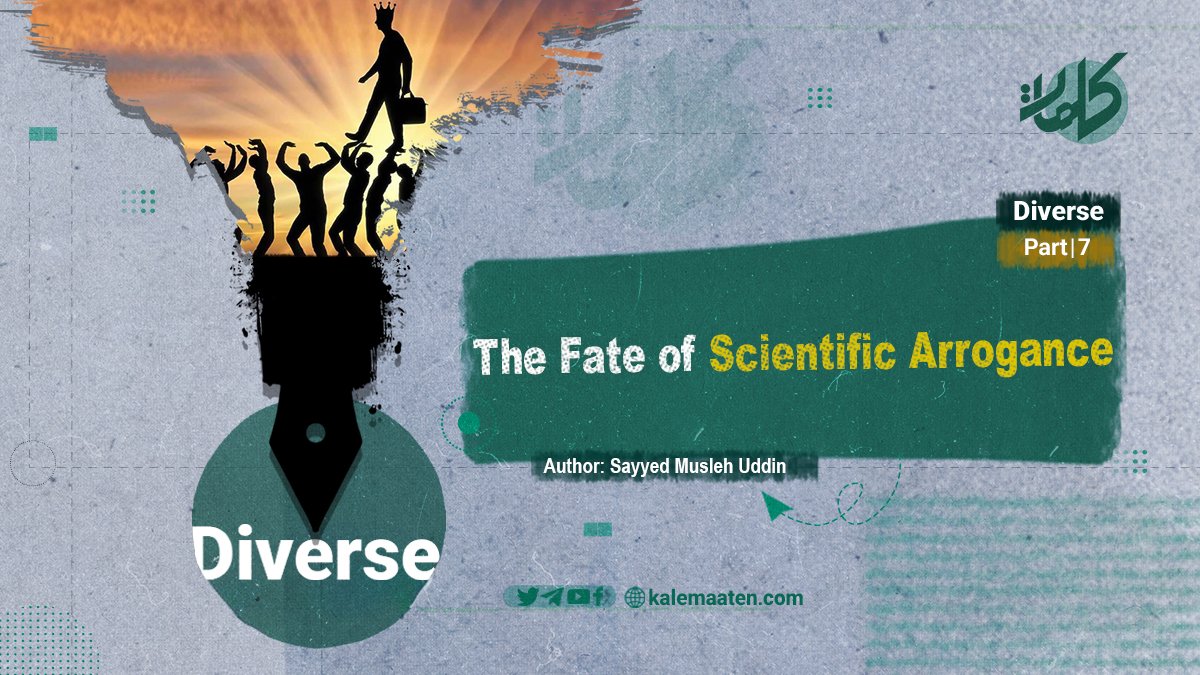Author: Sayyed Musleh Uddin
The Fate of Scientific Arrogance (Part 7)
Contentment in the Pursuit of Knowledge:
The human soul greatly fears poverty and deprivation, even though poverty is better for it than wealth that leads to arrogance and rebellion. Wealth is only valuable when accompanied by contentment and inner richness—not mere physical satiation. If the eye (i.e., human desire) is never satisfied, all the riches in the world will never suffice. Whoever loves the world and dedicates their life to acquiring wealth will harm their afterlife. Conversely, whoever loves the Hereafter and devotes their life to attaining its blessings will inevitably suffer some loss in their worldly life. Therefore, one should prioritize the eternal Hereafter over the fleeting world to attain everlasting blessings.
A religious scholar, recognizing the great blessing of knowledge—this vast spiritual treasure—and the divine favor of being chosen by Allah for the service of religion and the teaching of religious sciences, should be content with the bare minimum needed to survive and should not pursue worldly pleasures and endless material needs.
Allamah Ibrahim Ajari (MABH) said: “Whoever attains knowledge through enduring poverty and hunger will understand and retain it better.”
Imam Shāfiʿī (MABH) also said: “Whoever seeks knowledge through wealth, material honor, and worldly means will never succeed.” Indeed, whoever pursues it through poverty, humility, serving teachers, and sacrificing personal pride and status will undoubtedly attain it. He also stated: “Any student of knowledge who patiently endures the humility and abasement of the soul will one day reach the peak of knowledge and wisdom.” [1]
Belittling Knowledge:
One of the greatest concerns of sincere students and esteemed scholars in every era—especially in our current age of materialism and abundant conveniences—is financial hardship. Both devoted students who spend their time pursuing knowledge and noble scholars engaged in teaching religious sciences often find themselves in difficult circumstances. The small stipend (livelihood/compensation) they receive from religious schools is often barely sufficient for survival, is sometimes delayed for months, and does not cover even their basic needs.
Meanwhile, laypeople flaunt their wealth with the finest comforts, luxurious homes, and the latest cars. As a result, these students and scholars become disheartened due to their poverty. They grieve over their hardship, view worldly people as superior, and eventually begin to belittle their spiritual capital—namely, the knowledge of the Qur’an and Hadith. They lose their motivation to serve religion and teach and instead turn to the marketplace, hoping at the very least to match the material standards of worldly people.
Requirements for Aligning Knowledge with Practice Include:
– Maintaining dignity and composure
– Avoiding pride, arrogance, and egotism
– Practicing patience and perseverance
– Using clear and simple language when explaining issues
– Not being afraid to say “I do not know”
– Sincerity and consistency in responding to questions
– Avoiding pretentiousness and being humble in speech
– Paying full attention to the question and the reasoning of the listener
– Accepting the truth and sound arguments from anyone [2]
Signs of Ignorance:
The reality is that self-admiration, egotism, vanity, and overconfidence (i.e., arrogance and pride) are the root of all afflictions—whether in knowledge or wealth. This is a destructive disease that prevents one from ascending to the heights of success and progress in scholarly ranks, for arrogance is a sign and consequence of ignorance.
The Ostentation of a Scholar:
Fudayl ibn Iyad (MABH) said: “The sign of a scholar’s ostentation is that he becomes pleased, and his heart feels joy when praised for his knowledge and piety.”
“Outer knowledge is a mine of hatred and envy; inner knowledge is a mine of divine light and the Eternal One.” [3]
If There Is No Sincerity at the Beginning of Study:
If sincerity is lacking at the beginning of one’s pursuit of knowledge, one should still continue learning and not abandon it due to the absence of sincerity. Even if sincerity is not present at first, it is hoped that it will come later through the very act of acquiring knowledge. This is because knowledge itself makes one aware of the importance of sincerity. For instance, during one’s studies, one reads verses and hadiths emphasizing the value of sincerity and condemning ostentation and pride. The student then realizes their mistake and corrects their intention.
Continues…
Previous Part/ Next Part
[1] Jawahir al-‘Ilm, p. 325.
[2] Maqam ‘Ilm wa ‘Ulama, p. 191.
[3] Same



